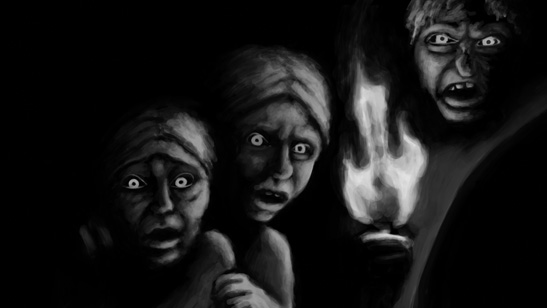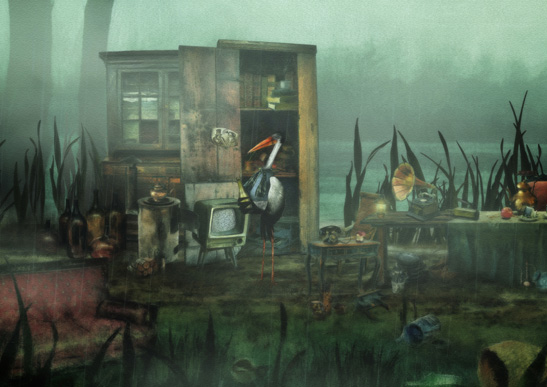Kellerkind, Julia Ocker
Kellerkind by Julia Ocker is an ode to the early years of German cinema and the monsters and shadows of the Expressionism movement.
Concerning the story of a woman that gives birth to a demon child, Ocker uses charcoal drawings to reflect a world of nightmares and creeping unease as the cries from the child locked away in the cellar constantly keep the its mother’s mind in tatters. An examination of the anxieties of birth, Kellerkind is vivid and disturbing, but all the more compelling for it.

Ride of Passage, Christian Bøving-Andersen
Ride of Passage by Christian Bøving-Andersen is a CG animation clearly in debt to the Pixar short films. As a young child is thrust into the jungle to find a ceremonial headdress, he befriends a giant chameleon that takes him on the ride of his life and helps him fulfil his rites of passage.
Full of childish wonder and whimsy, Ride of Passage is an absolute joy to watch and reminds you of just how fun animation can be.
Tea Party, Vitali Sichinava
Vitali Sichinava’s Tea Party is a dose of British oddball eccentricity. Recently jilted by his lover, a broken hearted stork goes for a walk along the river bank with a bottle of wine muttering to himself about the pain of love while reminding himself, and anyone who will listen, that he throws the best tea parties on the river bank.
Made with animation that resembles British children’s classics like Ivor the Engine, Sichinava’s piece is an understated and warm addition to the pantheon of the nation’s animation legacy.

Krake, Regina Welker
Krake by Regina Welker mixes 2D cel animation with 3D compositing and tells the tale of a young girl who finds a new friend growing in her hair. Initially, the two live happily side by side (or, more accurately, one on top of the other) until time passes and the Krake grows into a large jellyfish-like entity that threatens to derail both their lives.
Switching from childish joy to sinister drama, Krake takes the viewer on an emotional journey, but manages to warm the heart with a gleefully happy ending.

Pentimentos, Maria Antônia Dinelli Azvedo and Fabiano Santos
Maria Antônia Dinelli Azvedo and Fabiano Santos Bomfim’s Pentimentos is an exploration of memory and loss made with clay modelling and stop motion photography. An old man lives in a room filled from top to bottom with boxes each one containing memories of his past loves.
The film puts forth the notion that past memories and regrets can pile up and dominate a person’s later life and their depiction of memory, as fleeting encounters and snatched moments of joy, is beautiful and elegantly staged.
